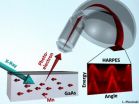(Press-News.org) A major three-year trial led by researchers at UCL, in partnership with the Health Protection Agency, has shown that giving one-to-one feedback to healthcare workers makes them twice as likely to clean their hands or use soap.
The Feedback Intervention Trial (FIT) is the first such trial to be done in a large number of hospitals anywhere in the world. Carried out across 60 wards in 16 hospitals that were already implementing the English and Welsh Cleanyourhands campaign, the study showed that an intervention that coupled feedback to personalised action planning improved hand-hygiene compliance by up to 18 per cent on Intensive Therapy Units (ITUs) and 13 per cent on Acute Care of the Elderly (ACE) wards. It was also found that soap use increased by 30%.
The study is published in PLOS ONE, and the main findings will be presented at a national hand hygiene summit held by GovToday on Wednesday 24th October to consider national hand hygiene strategy following discontinuation of the Cleanyourhands campaign.
"This is a landmark trial, as until now there has been no randomised controlled trial evidence showing which interventions improve hand hygiene compliance in modern hospitals," said principle investigator Dr Sheldon Stone (UCL Medical School at the Royal Free Hospital). "It is also the first trial to use behavioural sciences to change health care workers hand hygiene behaviour."
Sustained improvements in hand-hygiene are key to the World Health Organisation's SAVES LIVES strategy to reduce health-care associated infection, yet hand-hygiene compliance amongst healthcare workers remains poor, with levels of 25-40% being common.
"The study suggests that the NHS should explore using the FIT intervention and learn how best to implement it, as used properly it can be a really powerful tool," said Dr Stone. "The intervention, which couples feedback to personalised action planning, could be included in infection control teams' audit and appraisal systems in order to reduce the burden of healthcare associated infection on hospital wards."
The intervention process involved a four-week audit cycle, with healthcare workers observed for 20 minutes. Immediate feedback was given after the period of observation, and the person was then helped to form a personal action plan for better hand hygiene. The effect was stronger on ITUs than ACEs, where it was easier to implement. The more frequently wards carried out the intervention, the stronger its effect.
In addition to observing and measuring hand-hygiene compliance, the amount of soap and alcohol hand-rub used each month was also collected as another measure of hand-hygiene compliance for each ward. This also gave a better picture of the total weekly usage, as such data was not subject to any observational bias.
"Although audit and feedback is often suggested as a way of improving hand hygiene, this study puts its use on a firmer footing than previous non-randomised studies, providing the strongest evidence yet that this is an effective way to improve hand hygiene when coupled with a repeating cycle of personalised goal-setting and action planning," said Dr Stone.
### Notes for Editors
1. For more information or to speak to Dr Sheldon Stone (Principal Investigator) please contact George Wigmore in the UCL Media Relations Office on tel: +44 (0)20 7679 9041, out of hours +44 (0)7917 271 364, e-mail: g.wigmore@ucl.ac.uk
2. 'The Feedback Intervention Trial (FIT) – Improving Hand-Hygiene Compliance in UK Healthcare Workers: A Stepped Wedge Cluster Randomised Controlled Trial' is published online in the PLOS ONE. Copies of the paper are available from UCL Media Relations.
3. The Cleanyourhands campaign ensured provision of Alcohol hand-rub next to beds in all hospital wards, with posters and patient empowerment materials encouraging healthcare workers to clean their hands. In addition, audit and feedback of hand-hygiene compliance was given at least once every 6 months. The campaign, which was introduced in December 2004, was extremely increased soap and alcohol hand rub procurement by a factor of three and made a direct contribution to the falls in MRSA and Clostridium difficile. The campaign was discontinued by the Government in December 2010.
4. The study was funded mainly by the Department of Health (Patient Safety Research Programme) and by the Royal Free Trustees, with a contribution from GOJO industries
About UCL (University College London):
Founded in 1826, UCL was the first English university established after Oxford and Cambridge, the first to admit students regardless of race, class, religion or gender, and the first to provide systematic teaching of law, architecture and medicine. We are among the world's top universities, as reflected by performance in a range of international rankings and tables. UCL currently has 24,000 students from almost 140 countries, and more than 9,500 employees. Our annual income is over £800 million.
www.ucl.ac.uk | Follow us on Twitter @uclnews
Personalized feedback makes healthcare workers twice as likely to clean their hands
2012-10-24
ELSE PRESS RELEASES FROM THIS DATE:
Protein levels could predict if bowel cancer patients will benefit from Avastin
2012-10-24
Avastin, or Bevacizumab, has been shown to increase survival from bowel cancer in around ten to 15 per cent of patients, but it has been impossible to predict who will benefit.
Avastin works by targeting and blocking the VEGF-A protein, two major forms of which are VEGF165 and VEGF165b.
VEGF165 helps cancers to grow new blood vessels, so they can get food and oxygen from the blood - all cancers need a blood supply to be able to survive and grow. Its sister protein, VEGF165b, has the opposite effect and acts as a brake on this growth.
Cancer Research UK funded scientists ...
Penn Medicine researchers map strategy for 'choosing wisely' on low-value health care services
2012-10-24
PHILADELPHIA – Cutting the expenses associated with "low-value" medical tests and treatments – such as unnecessary imaging tests and antibiotics for viral infections that won't benefit from them – will require a multi-pronged plan targeting insurance companies, patients, and physicians, according to a JAMA Viewpoint article published this week by researchers from the Perelman School of Medicine at the University of Pennsylvania. These efforts transcend economic impact, however, and may also be essential for improving health care quality and patient safety.
The piece follows ...
Limitations to the 'revolutionary' findings of online studies
2012-10-24
'Direct to consumer' research, using data obtained through increasingly popular online communities such as 23andMe, PatientsLikeMe and the Personal Genome Project, has methodological limitations that are known to epidemiological studies, including selection bias, information bias, and confounding. These limitations mean that the results and conclusions of research using these methods need to be interpreted with caution, according to a paper published in the journal PLoS Medicine.
Cecile Janssens, PhD, formerly of the Erasmus University Medical Center in The Netherlands ...
Study: Amish children are 2 times more physically active than non-Amish children
2012-10-24
BALTIMORE, Md. – Oct. 23, 2012. Old Order Amish children are much more physically active and three times less likely to be overweight than non-Amish children, which may provide them with some long-term protection against developing Type 2 diabetes, University of Maryland School of Medicine researchers report in the journal Diabetes Care.
The researchers found that Amish children in Lancaster County, Pa., spent an additional 34 minutes a day in light physical activity, plus another 53 additional minutes a day in moderate to vigorous activity compared to non-Amish white ...
Neuroscientists propose revolutionary DNA-based approach to map wiring of whole brain
2012-10-24
Cold Spring Harbor, NY -- A team of neuroscientists has proposed a new and potentially revolutionary way of obtaining a neuronal connectivity map (the "connectome") of the whole brain of the mouse. The details are set forth in an essay published October 23 in the open-access journal PLOS Biology.
The team, led by Professor Anthony Zador, Ph.D., of Cold Spring Harbor Laboratory, aims to provide a comprehensive account of neural connectivity. At present the only method for obtaining this information with high precision relies on examining individual cell-to-cell contacts ...
Twitter principles of social networking increase family success in nesting birds
2012-10-24
New research carried out by scientists at Universities in Exeter, France and Switzerland reveals for the first time the importance of social networking in producing a successful family.
The study found that, regardless of how big and healthy individual chicks are, what really matters to their chances of surviving and breeding is how siblings in the nest interact with each other, with cooperative families faring best.
Differences in patterns of feeding between mothers and fathers were a key factor in determining the behaviour of their offspring, according to the study ...
Summer babies less likely to be CEOs: UBC research
2012-10-24
Sauder School of Business researchers at the University of British Columbia have found that a person's date of birth can affect their climb up the corporate ladder.
The Sauder study shows that only 6.13 per cent of an S&P 500 CEO sample was born in June and only 5.87 per cent of the sample was born in July. By comparison, people born in March and April represented 12.53 per cent and 10.67 per cent of the sample of CEOs.
"Our findings indicate that summer babies underperform in the ranks of CEOs as a result of the 'birth-date effect,' a phenomenon resulting from the ...
Blood chromosome differences are linked to pancreatic cancer
2012-10-24
MADISON – A new study shows that a blood marker is linked to pancreatic cancer, according to a study published today by scientists at the University of Wisconsin Carbone Cancer Center and Mayo Clinic.
First author Dr. Halcyon Skinner, assistant professor of population health sciences at the University of Wisconsin School of Medicine and Public Health, says the study is the first time pancreatic cancer risk has been linked to differences in telomeres' length in blood cells.
"This suggests a new avenue to identify those with pancreatic cancer or those at risk of developing ...
Genetic patterns of deep-sea coral provide insights into evolution of marine life
2012-10-24
The ability of deep-sea corals to harbor a broad array of marine life, including commercially important fish species, make these habitat-forming organisms of immediate interest to conservationists, managers, and scientists. Understanding and protecting corals requires knowledge of the historical processes that have shaped their biodiversity and biogeography.
While little is known about these processes, new research described in the journal Molecular Ecology helps elucidate the historical patterns of deep-sea coral migration and gene flow, coincident with oceanic circulation ...
New finding could pave way to faster, smaller electronics
2012-10-24
University of California, Davis, researchers for the first time have looked inside gallium manganese arsenide, a type of material known as a "dilute magnetic semiconductor" that could open up an entirely new class of faster, smaller devices based on an emerging field known as "spintronics."
Materials of this type might be used to read and write digital information not by using the electron's charge, as is the case with today's electronic devices, but by using its "spin."
Understanding the magnetic behavior of atoms is key to designing spintronics materials that could ...

